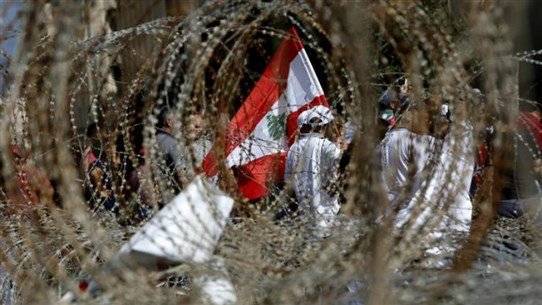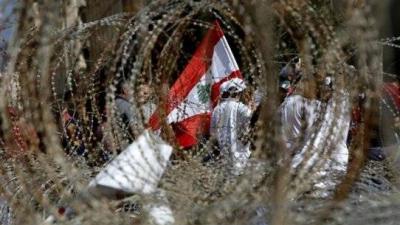Lebanon has "officially" entered the phase of completing the process of reconstituting power, with new Parliament and Government, based on the outcomes of the May 15 elections that resulted in a "negative balance" between a majority that left the coalition square of "Hezbollah," the "Free Patriotic Movement," and their allies, versus their opponents from what is called the "sovereign forces," the "change forces," and independents who find it difficult to fit into a single cart that constitutes a permanent majority.
With Prime Minister Najib Mikati's government effectively resigned following the end of the 2018 Parliament's term at midnight Saturday-Sunday, Lebanon is now bound in the coming weeks to a constitutional agenda with specific priorities, though the outcomes remain unclear, as its deadlines race against the financial collapse that is "creeping" toward more severe horizontal levels, highlighted by the dollar price in the parallel market reaching 32,000 lira, the most drastic erosion of the national currency since the onset of free fall in March 2020.
As Mikati's government enters the caretaker phase—having been formed on September 10, 2021—the country now stands on "one and a half legs" facing looming financial and living "hurricanes," which are fed by political crises, beginning from the electing of the Parliament's President in 2022 and his deputy to the Council's Bureau, passing through the appointment of a Prime Minister and then its formation, and culminating in the election of a new President of the Republic (with President Michel Aoun's term ending on October 31).
The session to re-elect President Nabih Berri for a seventh consecutive term in Parliament (since 1992 and his parliamentary bloc nominated him yesterday) is contingent upon communications aiming to diffuse political and sectarian tensions, amid indications that this session (which must be called by the oldest member, who is Berri himself this time, by June 5 at the latest) has become captive to a "single basket" approach between electing the President and the Deputy, governed by attempts at negotiation within a single bloc (between Berri and the Free Patriotic Movement) regarding the position of the Deputy President (for Elias Bou Saab), while the "suspended" majority seeks to make the "white bloc" the largest against Berri, alongside efforts to place one of its own as his Deputy even through compromises (making the chances of a change deputy like Melhem Khalaf higher than that of the Lebanese Forces' Ghassan Hasbani).
While awaiting what developments the coming days will bring on this front, amid Berri's response to rumors of his intention to refrain from running for the Presidency of the Parliament, there remains concern that the "fragmented" parliamentary map will lead to an early paralysis of all related "string" of milestones tied to completing the composition of the elected Parliament, while no one seems able to foresee the path of forming a new government starting from appointing its President, knowing that this file is under a ticking deadline that diminishes as the 2022 Parliament's sessions are delayed.
By August 31, the Parliament will turn into an electoral body until a new President is elected, otherwise, the government between the parliamentary and presidential elections will find itself in a "unified fate and course" with the "2022 Presidency," where a vacancy is expected to replicate the situation that has twice affected the Baabda Palace in 2007 (until May 2008) and 2014 (until October 2016), with the difference being that it may be the first time in Lebanon's history that a caretaker government shall bear the "Presidential cap."
It was not coincidental that on the eve of Mikati's government transitioning to caretaker status, it managed to push through a series of financial items, partly aimed at "buying time" and disabling "explosive" living conditions, such as providing funding for medicines for chronic and terminal illnesses still subsidized for four months. Some of these items had a "smuggled" nature, albeit under the guise of averting an imminent collapse of vital sectors such as telecommunications, where a decision was taken to raise tariffs (for mobile services) by more than five times (starting from July) such that a bill that previously cost a subscriber $100 or 150,000 lira (at a rate of 1,500 lira) will be reduced to about one third, translating to roughly $33 which will be collected at a fluctuating rate from the "Sayrafa" platform, currently around 23,600 lira, thus leading to a bill of about 778,700 lira, described as "the highest telecommunications bill in the world to be paid by the poorest people in the world" according to Youth and Sports Minister George Kallas.
While the issue of raising the exchange rate used for customs dollar calculations (still based on 1,500 lira) is postponed to avoid triggering a "popular outrage" feared to be uncontrollable, the Ministry of Economy's decision to restrict subsidized wheat usage for Arabic bread production (alongside requesting to open a credit line of $21.5 million for two months to purchase subsidized wheat until the implementation of a $150 million loan from the World Bank) temporarily alleviates the bread crisis but warns that prices for manakish, French bread, hamburger bread, and baguettes may "soar" and become "burdensome" for a significant number of Lebanese who are enduring one of the three worst financial crises in history since 1850.
The government's approval of the financial and economic recovery plan, which constituted the cornerstone of the preliminary agreement with the International Monetary Fund on a financing package of about $3 billion over four years, also stirred controversy as Deputy Prime Minister Saada al-Shami outlined the plan, indicating that banking sector losses are estimated at $78 billion and losses at the Central Bank at $63 billion. Mikati clarified that "deposits up to $100,000 will be fully protected under the agreement and we are seeking to raise this ceiling during negotiations. The chances for rescue will not be available without the World Bank, and the Central Bank must set the necessary criteria to ensure economic growth."




